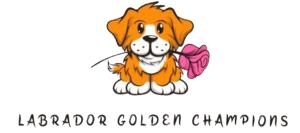Title: Flat-Coated Retriever vs Golden Retriever: 7 Key Differences
Introduction:
Flat-Coated Retrievers and Golden Retrievers are both beloved breeds known for their friendly demeanor and intelligence. While they share some similarities, such as their retriever heritage, there are distinct differences between the two breeds. In this article, we’ll explore seven key differences to help you better understand which breed may be the right fit for your lifestyle and preferences.
1. Coat Color and Texture:
Flat-Coated Retriever:
– The Flat-Coated Retriever has a sleek, shiny black coat that lies flat against the body.
– Their coat requires regular grooming to prevent mats and tangles, but they shed moderately year-round.
Golden Retriever:
– Golden Retrievers have a dense, water-repellent double coat that comes in various shades of gold.
– Their coat is longer and requires more frequent grooming to control shedding, especially during seasonal changes.
2. Size and Build:
Flat-Coated Retriever:
– Flat-Coated Retrievers are slightly taller and leaner than Golden Retrievers.
– Males typically stand between 23 to 24.5 inches tall at the shoulder, while females range from 22 to 23.5 inches.
Golden Retriever:
– Golden Retrievers are sturdy, medium to large-sized dogs with a well-proportioned build.
– Males typically stand between 23 to 24 inches tall at the shoulder, while females range from 21.5 to 22.5 inches.
3. Temperament and Personality:
Flat-Coated Retriever:
– Flat-Coated Retrievers are known for their exuberant and playful nature.
– They are affectionate, outgoing, and love to be around people and other pets.
– Flat-Coated Retrievers retain their puppy-like energy well into adulthood and enjoy engaging in various activities.
Golden Retriever:
– Golden Retrievers are friendly, gentle, and eager to please, making them excellent family pets.
– They have a calm and tolerant demeanor, making them well-suited for households with children and other pets.
– Golden Retrievers are known for their intelligence and trainability, excelling in obedience and therapy work.
4. Exercise Needs:
Flat-Coated Retriever:
– Flat-Coated Retrievers have high energy levels and require plenty of daily exercise and mental stimulation.
– They enjoy activities such as hiking, swimming, retrieving games, and agility training.
– Without sufficient exercise, Flat-Coated Retrievers may become bored and exhibit destructive behaviors.
Golden Retriever:
– Golden Retrievers are moderately active and require daily exercise to maintain their physical and mental health.
– They enjoy activities such as brisk walks, jogging, fetching, and obedience training.
– Golden Retrievers thrive in environments where they can participate in regular outdoor activities with their families.
5. Trainability and Intelligence:
Flat-Coated Retriever:
– Flat-Coated Retrievers are intelligent and eager to please, but they may have an independent streak.
– They respond well to positive reinforcement training methods and enjoy learning new tricks and commands.
– Consistent training and socialization are essential to channel their intelligence and prevent boredom.
Golden Retriever:
– Golden Retrievers are highly intelligent and easy to train, making them popular choices for obedience and agility competitions.
– They have a strong desire to please their owners and excel in various training activities.
– Golden Retrievers thrive on positive reinforcement and gentle guidance, responding well to praise and rewards.
6. Health Considerations:
Flat-Coated Retriever:
– Flat-Coated Retrievers are generally healthy dogs, but they may be prone to certain genetic health conditions.
– Common health concerns include hip dysplasia, elbow dysplasia, cancer, and progressive retinal atrophy (PRA).
– Regular veterinary check-ups, a nutritious diet, and proper exercise can help prevent or manage health issues in Flat-Coated Retrievers.
Golden Retriever:
– Golden Retrievers are susceptible to various health conditions, including hip dysplasia, elbow dysplasia, and certain genetic disorders.
– They may also be prone to obesity, heart disease, and skin allergies.
– Responsible breeding practices and regular health screenings can help reduce the risk of hereditary health problems in Golden Retrievers.
7. Lifespan:
Flat-Coated Retriever:
– The average lifespan of a Flat-Coated Retriever is between 8 to 10 years.
– Proper care, nutrition, and regular exercise can help extend their lifespan and improve their quality of life.
Golden Retriever:
– Golden Retrievers typically live between 10 to 12 years, although some may live longer with proper care.
– Providing a balanced diet, regular veterinary care, and plenty of mental and physical stimulation can help maximize their lifespan.
Conclusion:
While Flat-Coated Retrievers and Golden Retrievers share many wonderful qualities, there are distinct differences between the two breeds that prospective owners should consider. Whether you’re drawn to the sleek black coat of the Flat-Coated Retriever or the golden fur of the Golden Retriever, understanding these key differences can help you make an informed decision about which breed best suits your lifestyle, preferences, and needs.
